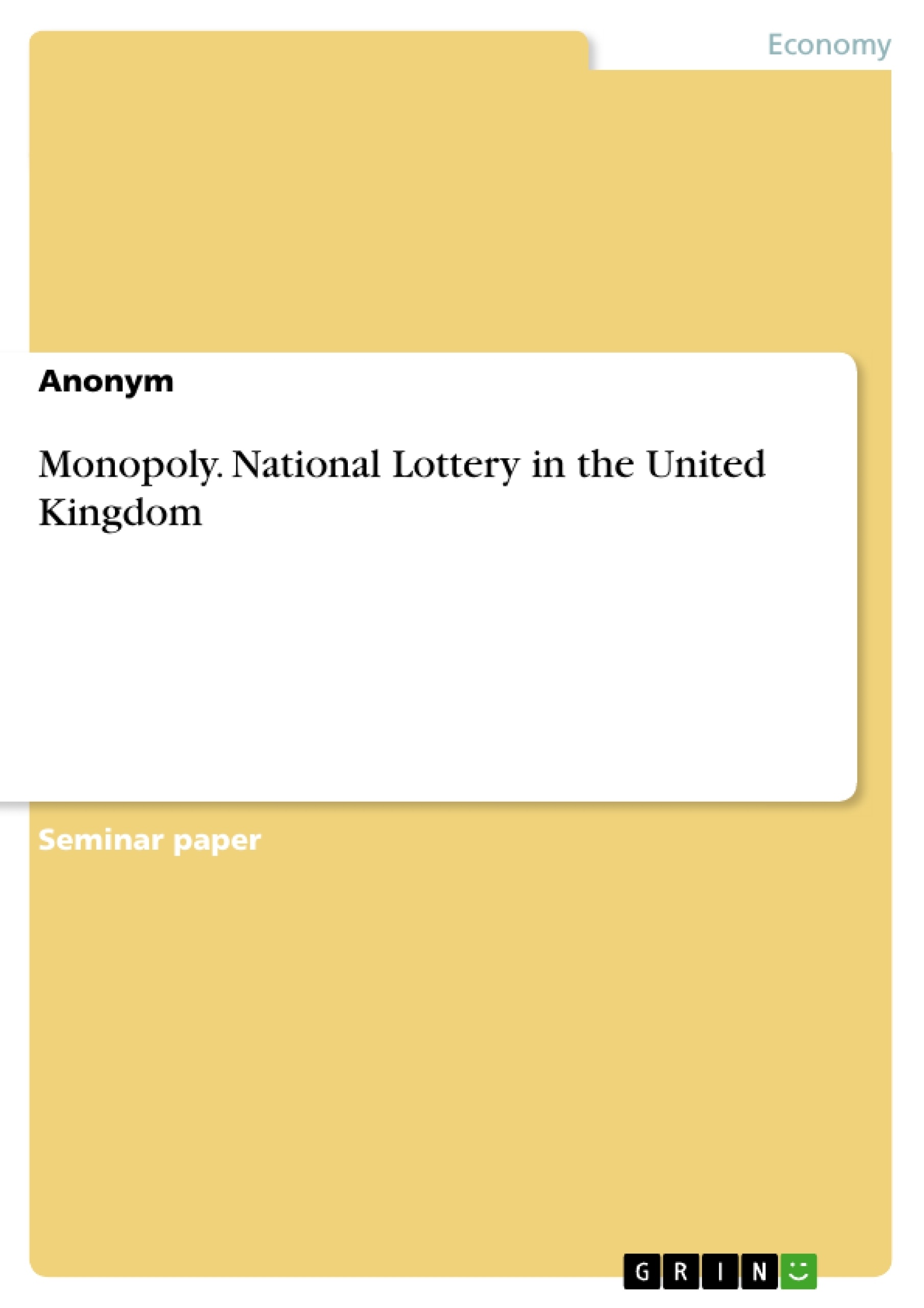Excerpt
Abstract
This paper explores a monopoly, the National Lottery in the United Kingdom, run by the Camelot Group.
The purpose of this study is to feature and to understand the National Lottery as a monopoly.
Definition of a monopoly, analysis and interpretation of the National Lottery will be presented. The conclusion about the necessity of the monopoly will be discussed as well.
Introduction
At the moment 70% of the UK’s population play National Lottery and £11,200 worth of online tickets are sold every 100 seconds1.
Hence, it is not surprising that the National Lottery, which is a state - controlled monopoly, arouses the interests of the other regulators.
The questions to be solved are whether a gambling monopoly is regulatory justified and whether the consequent enforcement of a monopoly can evoke other problems. In addition to that in the first sector is going to be about the company background and general aspects about a monopoly. In the second section the existing reasons for a monopoly and the costs & benefits for a consumer/ taxpayer will be analysed. The last paragraph includes the deregulation or privatisation, the costs and benefits of it and the conclusion.
Company background
First of all, an impression about the Camelot Group and its connection to the National Lottery will be given.
The Camelot Group was founded as a consortium to bid for the National Lottery project in 1993 in the United Kingdom. With a bid of £ 6,844m it was the highest bidder out of 7 for getting the lottery licence for the next 7 years from the National Lottery. (Douglas, 2001)
This makes the UK lottery unique because it is run by a private company which is owned by five shareholders, and not by the state.
Since 1994 the Camelot Group is holding the licence and will keep it until 2019 with
an option to extend for the next 5 years.
The Camelot Group also provides private management, consultancy, and interactive and commercial services.
So far the Camelot Group is holding a lottery monopoly in the UK.
Monopoly theory & diagram
Many people might think about the board game when they hear the word monopoly. And there is even a connection between the board game and the real world monopoly.
The goal in the board game is to buy up all of the properties of a certain colour so that if somebody lands on them, you can charge a higher price. And this is basically how a monopoly works in the real world.
A monopoly buys up all the producers and suppliers of a good/service so that they are the only ones who are in command of them and can therefore charge higher prices.
In order for a monopoly to hold there are 3 conditions:
1. Only one company sells the good/service.
2. No close substitutes to the good because if there were close substitutes people could buy those and ignore the monopoly.
3. There are barriers to entry, which protect the monopoly from competition.2
The theory above is also shown in the monopoly diagram below.
Illustration 1: Monopoly Diagram
First of all, the negatively sloped demand curve for a monopoly looks a lot like the market demand curve this is due to the fact that the monopoly is the market, controls it and sets prices and quantities. But the demand curve is not totally elastic. It is always equals the average revenue curve. The price also equals the average revenue.
Monopolies are price makers and not price takers because they have the ability to set a price above the marginal cost. They choose higher prices and lower consumption than in a competitive market. They do not have a supply curve because they do not respond to the price but if they want to sell more, they have to reduce
[...]
1 http://www.bannedsystems.co.uk/thelotterysite/facts.htm
2 http://www.cliffsnotes.com/study_guide/topicArticleId-9789,articleId-9767.html
- Quote paper
- Anonymous, 2012, Monopoly. National Lottery in the United Kingdom, Munich, GRIN Verlag, https://www.grin.com/document/282910
Publish now - it's free






















Comments